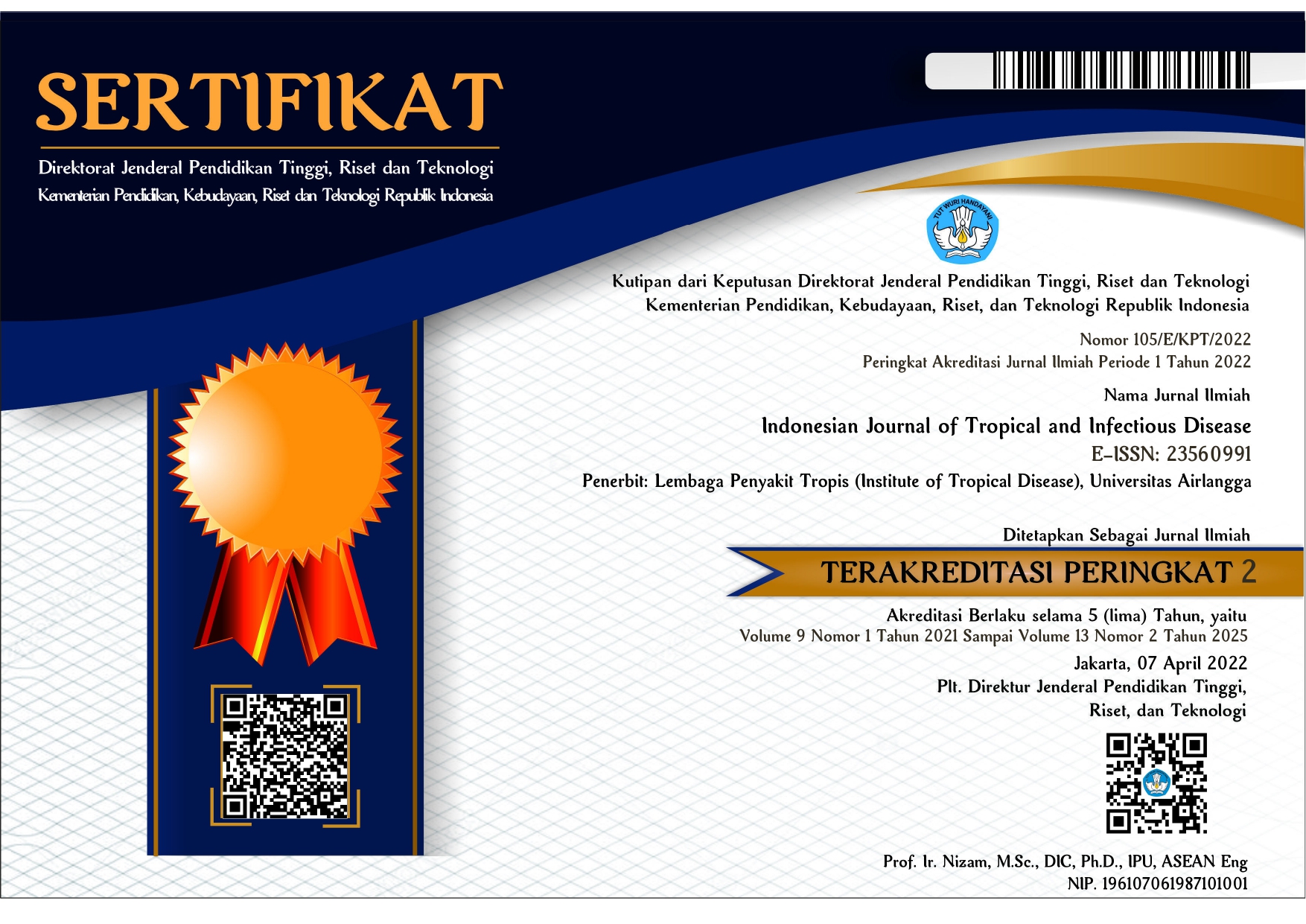Relationship between Knowledge and Stigma with Attitude Towards People with Leprosy in Professional Nursing Students
Downloads
The bacteria Mycobacterium leprae is the source of the chronic infectious illness leprosy (M. leprae). In society, leprosy still carries a shame. The erroneous impression of leprosy gives birth to stigma. Leprosy is thought to be brought on by curses, witchcraft, divine retribution, sin, or genetics. A person's perception of leprosy and lack of understanding about it might have an impact on how they feel about those who have it. Even among health students, information alone will not be sufficient to end the stigma against those who have leprosy; also, students need to learn how to develop greater empathy for those who have the disease. This study sought to ascertain the association between leprosy knowledge and stigma and attitudes among nursing students at the professional level. In this study, a cross-sectional methodology is used with a descriptive correlational design. A total 320 professional nursing students participated in the survey. Total sampling was used to select respondents based on inclusion and exclusion criteria. Utilizing the SPSS version 21, data were gathered by questionnaire and analyzed using the Spearman's rho test at a significance level of 0.05. The Spearman's rho test results revealed a positive link between attitude and knowledge (p=0.001), but a negative relationship between attitude and stigma (p=0.000). It was determined that attitudes toward people with leprosy were significantly influenced by information, stigma, and those attitudes. The better the mindset, the more one knows about leprosy. Leprosy patients are treated better when there is less stigma associated with their condition.
Amiruddin MD. Penyakit kusta: Sebuah pendekatan klinis. Firstbox Media; 2019.
Ridwan M. Analisis Faktor Yang Berhubungan Dengan Timbulnya Stigma Kusta Pada Masyarakat Berdasarkan Teori Transcultural Nursing Di Puskesmas Burneh Kabupaten Bangkalan. Universitas Airlangga; 2017.
Van Brakel W. Stigma in leprosy: concepts, causes and determinants. Lepr Rev. 2014;85:36–47.
Da Silva MCD, Paz EPA. Nursing care experiences with Hansen's disease patients: Contributions from hermeneutics. ACTA Paul Enferm [Internet]. 2017;30(4):435–41. Available from: https://www.scopus.com/inward/record.uri?eid=2-s2.0-85033697274&doi=10.1590%2F1982-0194201700064&partnerID=40&md5=e640204f8c5d355821b0569641ee8b83
Gopalakrishnan S, Grace GA, Sujitha P, Eashwar VMA. Knowledge, attitude, and health seeking behavior on leprosy among urban adults in Kancheepuram district of Tamil Nadu: A Community-based cross-sectional study. J Fam Med Prim Care. 2021;10(5):1895.
Grewal I, Negi Y, Kishore J, Adhish S V. Knowledge and attitude about Leprosy in Delhi in post elimination phase. Indian J Lepr. 2013;85:123–7.
Rufina A. Hubungan Antara Tingkat Pengetahuan dengan Stigma Terhadap Hansen's Disease pada Mahasiswa FK USU. 2018;
Kemenkes RI. infoDatin-kusta-2018. 2018.
Aulia PW 2019. Stigma Terhadap Penderita Kusta. 2019.
Laili Afnur. Hubungan Akses Pelayanan Kesehatan, Dukungan Keluarga Dan Pengetahuan Penderita Kusta Dengan Perawatan Diri Penderita Kusta (Studi di Puskesmas Grati Kabupaten Pasuruan Tahun 2016). Universitas Airlangga; 2017.
Lusli M, Zweekhorst M, Miranda-Galarza B, Peters RMH, Cummings S, Seda FSSE, et al. Dealing with stigma: experiences of persons affected by disabilities and leprosy. Biomed Res Int. 2015;2015.
Yuda AA. Hubungan Karakteristik, Pengetahuan, Sikap Dan Tindakan Penderita Tuberkulosis Paru Dengan Kepatuhan Minum Obat Di Puskesmas Tanah Kalikedinding. Universitas Airlangga; 2019.
Multinovic M, Dusic A, Gugnani HC, Heckburn R, Marcelin D. Awareness of Leprosy in Students of Basic Sciences in Saint James School of Medicine, Bonaire (Dutch Caribbean). Indian J Commun Dis. 2015;1(1).
Green LW, Kreuter M, Deeds SG, Partridge KB. Health education planning: A diagnostic approach. In: Health education planning: a diagnostic approach. 1980. p. 306.
PPNI, AIPNI Aipd. Standar Kompetensi Perawat Indonesia Edisi IV. 2013;
Nursalam. Metode Penelitian Ilmu Keperawatan, Pendekatan Praktis. Edisi 4. Lestasi PP, editor. Jakarta: Salemba Medika; 2017. 454 p.
Kurniasari CI. Pengaruh Gabungan Sugesti dan Musik Instrumentalia Terhadap Peningkatan Kualitas Tidur Pada Lansia di Griya Lansia Santo Yosef Surabaya. Universitas Airlangga; 2015.
Asmaradianti A. Correlation Of Knowledge With Attitude And Stigma Towards Leprosy Among Medical Students And Non Medical Students In Universitas Airlangga. Universitas Airlangga; 2018.
Morgado FF da R, Silveira EMKX da, Sales AM, Nascimento LPR do, Sarno EN, Nery JA da C, et al. Cross-cultural adaptation of the EMIC Stigma Scale for people with leprosy in Brazil. Rev Saude Publica. 2017;51:80.
Peters RMH, Dadun WH, Zweekhorst MBM, Damayanti R, Bunders JFG. The cultural validation of two scales to assess social stigma in leprosy. PLoS Negl Trop Dis. 2014;8(11).
NWOKEJI SC. Assessment of stigma among people living with Hansen's disease in south-east Nigeria. Lepr Rev. 2017;88:43–57.
Bergman L, Britton A. Nurse's experiences of leprosy related stigma in Ghana. 2014.
Sharma A, Garima G, Sharma N, Sharma S, Singh N, Vohra P, et al. Comparative study of knowledge and awareness about leprosy among medical college students pre and post state leprosy sensitisation program in mewat, haryana, india. J Clin Diagnostic Res [Internet]. 2018;12(8):BC29–32. Available from: https://www.scopus.com/inward/record.uri?eid=2-s2.0-85051144512&doi=10.7860%2FJCDR%2F2018%2F33981.11958&partnerID=40&md5=8aaac8a4c2b7acaab7ddc646a9a3cad4
Singh R, Singh B, Mahato S. Community knowledge, attitude, and perceived stigma of leprosy amongst community members living in Dhanusha and Parsa districts of Southern Central Nepal. PLoS Negl Trop Dis [Internet]. 2019;13(1). Available from: https://www.scopus.com/inward/record.uri?eid=2-s2.0-85059879350&doi=10.1371%2Fjournal.pntd.0007075&partnerID=40&md5=265ab570fd25d487f9b89b6c2074e8c3
Earnshaw VA, Quinn DM. The impact of stigma in healthcare on people living with chronic illnesses. J Health Psychol. 2012;17(2):157–68.
Kaehler N, Adhikar B, Raut S, Marahatta SB, Chapman RS. Perceived stigma towards leprosy among community members living close to Nonsomboon leprosy Colony in Thailand. PLoS One. 2015;10(6):e0129086.
Menaldi SLSW. Pedoman Nasional Pelayanan Kedokteran Tata Laksana Kusta. 2019;
Copyright (c) 2024 Indonesian Journal of Tropical and Infectious Disease

This work is licensed under a Creative Commons Attribution-NonCommercial-ShareAlike 4.0 International License.
The Indonesian Journal of Tropical and Infectious Disease (IJTID) is a scientific peer-reviewed journal freely available to be accessed, downloaded, and used for research. All articles published in the IJTID are licensed under the Creative Commons Attribution-NonCommercial-ShareAlike 4.0 International License, which is under the following terms:
Attribution ” You must give appropriate credit, link to the license, and indicate if changes were made. You may do so reasonably, but not in any way that suggests the licensor endorses you or your use.
NonCommercial ” You may not use the material for commercial purposes.
ShareAlike ” If you remix, transform, or build upon the material, you must distribute your contributions under the same license as the original.
No additional restrictions ” You may not apply legal terms or technological measures that legally restrict others from doing anything the license permits.























